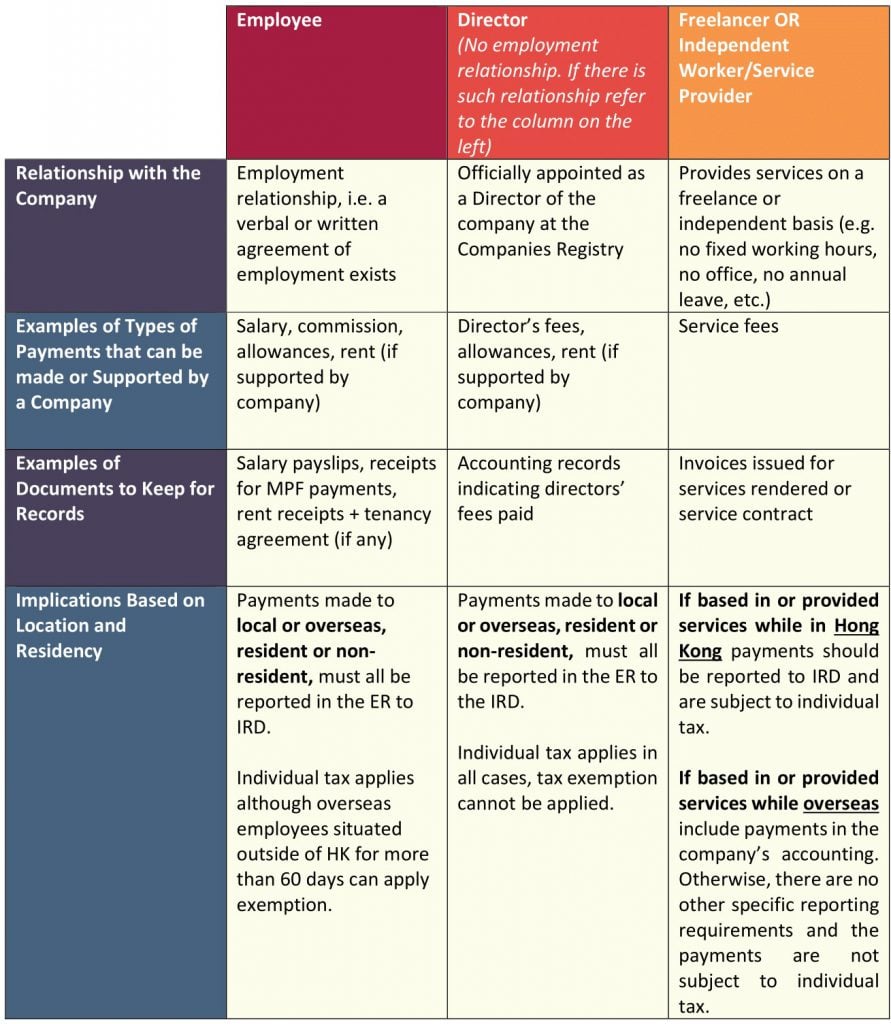Employee vs Director vs Freelancer or Independent Worker: What’s the Difference?
Typically, when a Hong Kong company wants to set up a professional relationship with an individual, they may classify them as an employee, director, or freelancer/independent contractor. To make the right choice, it is necessary to be aware of what each option implies as it could have an impact on where payments made to the individual are reported, how that person is taxed, and more.
(Short for time? Click here for our summary table)

Employees
It may seem obvious, but it is important to point out that an employee is a person who has an employment relationship with a company, i.e. a verbal or written agreement of employment exists between both parties.
Whether based locally or overseas, employees of a Hong Kong company must be registered at the Inland Revenue Department (IRD), and for MPF and compensation insurance (if applicable – overseas employees are exempt if they are members of an overseas retirement scheme, or if they have permission to remain in HK for employment purposes for no more than 13 months).
Employers must report all payments made to an employee whether salary, commission or other fees in the Employer’s Return (ER) to the IRD. If the employer supports any rent for the individual this should also be reported in the ER.
Payments made to an employee are subject to individual salaries tax. However, if the employee is located outside of and does not visit Hong Kong for more than 60 days of a tax assessment year, regardless of residency, he/she can apply for individual tax exemption. More information on these requirements can be found here.
With the above in mind, it is vital that an employer keeps track of all payments made and retains supporting documentation to support the expense* (e.g. payslips, MPF records, rent receipts, etc.).
Directors
By directors, we refer to a person officially appointed as a director of a company at the Companies Registry. Full details of the role and responsibilities of a director can be found here.
For their role as director, a director usually receives directors’ fees which are always subject to salaries tax (i.e. individual tax exemption cannot be applied for regardless of residency of the individual). Now, if a director provides a company services other than as a director, they should be employed by the company and treated as an employee (as described above) rather than as a freelancer or independent worker.
Any payments made to or supported on behalf of a director should be reported in the ER, and records must be kept.
Freelancers and Independent Workers
Freelancers and independent workers/service providers are persons who have no employment relationship with a company and provide services on a freelance or independent basis rather than as an employee (e.g. no fixed working hours, no office, no annual leave, etc.).
There are different reporting implications depending on where the freelancer or independent worker provided services as follows:
- Based in or provided services while in Hong Kong – Payments should be reported in the relevant specified form from IRD and are subject to individual tax.
- Based in and provided services while overseas – There are no specific requirements to report payments to IRD. However, IRD may request further detail upon reviewing the company’s audited accounts during tax filing.
Note that persons hired in this capacity should provide invoices or service contract to a company for recordkeeping and accounting purposes.
The Employer Must Decide
Ultimately it is up to the employer to determine what type of relationship they intend to maintain with the person they will be paying and then decide the appropriate job classification accordingly. Tax implications may be the biggest driving force for selecting job classification, particularly if the employer is also a director or shareholder of a company. A good complementary article to check out in this regard: How To Pay Employees, Directors, and/or Shareholders.
*Note: Hong Kong companies are legally required to retain records of all payments as part of their operating records for a minimum of 7 years.
For a quick overview, check out the summary table below:

Need help determining the most appropriate job classification or reporting payments to IRD? iNCUBEE can help!
iNCUBEE can also help with other Hong Kong Company needs. Click the link above to get more information!


